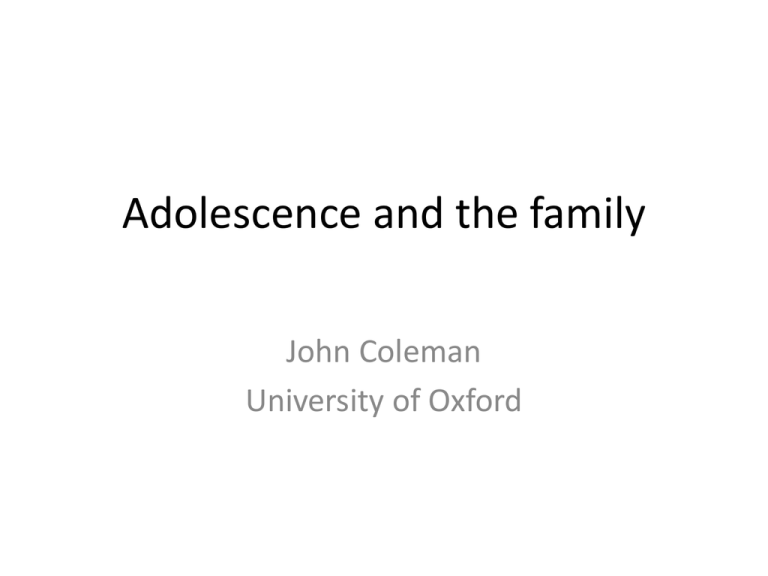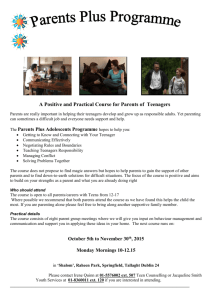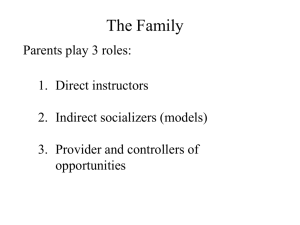Adolescence and the family John Coleman University of Oxford
advertisement

Adolescence and the family John Coleman University of Oxford Scope of the presentation • • • • • Social change Why families of teenagers matter Conflict and the generation gap Family environment and adolescent development The influence of the home environment on educational achievement • Divorce and the changing nature of families • Parenting teenagers – the challenges. Some parents’ views “They’re like a train on a track – it only goes in one direction. Like when they get to 14 or 15 it’s like they’ve gone into a tunnel and the only thing they see at the end of that very, very long tunnel is a reflection of themselves. And you, the parents, are in pitch darkness, you’re not in their field of vision. They do come out of it eventually. The daughter of a friend of mine now says:”All I could see was myself”. Not all saintly and sweet! “My daughter and I had quite a hard time of it. It seemed to me that whenever I said anything she thought I was picking on her. It was quite nasty, and I found her insolent and rude. My husband said I had a special tone of voice when I was speaking to her. I felt that I was having to be so careful because anything I said was snapped at. And sometimes I snapped back. We weren’t always saintly and sweet!” Families and social change • There have been many changes in the nature of the family in recent decades • Increase in families headed by a lone parent • More step-families and other family forms • Young people remain in the family home for longer • More of a focus on the different roles of mothers and fathers • Recognition of the life changes of the adults themselves, including changes in working patterns, and more women (mothers) in the labour market. Why families of teenagers matter • Most people think that peers take over as the key reference group in adolescence • Research shows that not to be true • Both peers and parents are important – for different reasons • All research shows that good outcomes depend on involvement of the family • Parents affect self-esteem, school achievement, health, and the degree of risk-taking. Some young people’s views about parents I think parents are something that you can come back to and rely on, because we are supposed to be out there learning about life, but you need something to fall back on if it all goes wrong. I know that me and my Mum scream like we’re going to kill each other, but she’s always there. I know she’s never going to abandon me if I’m in trouble and stuff. 14 year-old girl A safe environment My family is so important to me ....Probably being just a safe environment where you feel like you can step back from everything else that goes on around you .... I think nonjudgemental is good, because you get judged from every angle all the time, and it is good to have a place where you can talk, and not be, you know, like judged all the time. 16 year-old girl. Changing views of separation from parents • Early assumptions about separation and disengagement from parents have been re-examined • Research shows that most young people get on well with their parents • Studies show that it is possible to develop autonomy without separation from the parents • Some talk of interdependence, and others of connectedness • This has become especially important with adolescence lasting longer, and young people staying at home till they are older. Conflict and the generation gap • If most young people get on well with parents, what do they disagree about? • The answer is that the disagreements are mostly about everyday issues such as untidy bedrooms, clothes, time of coming home at night and so on • Most important, conflict is often about who has authority, rather than who is right – social domain theory • Of course there are some families in which there is serious disagreement and conflict, but there are usually other explanations for this. More views of young people My parents might give me ideas about what I want to do, but I am still going to do what I want to do. 14 year-old boy. If they say something like “you can’t do that” then I argue back, saying “yes, I can”. And they’d say, “that’s wrong”, and I’d be like “It’s right”, but that’s just growing up. We argue and argue, but in the end we are ok. I think quite a few people are like that. 16 year-old girl. Understanding the disagreements • Social domain theory – Judith Smetana – argues that much depends on how parents and young people define the problem. Violations of domains of authority cause conflict. • Where disagreements occur, this will not necessarily lead to breakdown in relationships • Young people, and parents, can learn how to manage conflict • Research shows that good communication between the generations is one of the keys to a reduction in conflict. Family environment and adolescent development • Work on parenting styles ( Maccoby and Martin, 1983) has been very influential • The four styles are: Authoritarian Authoritative Indulgent Indifferent Definitions of the four parenting styles • Authoritarian parenting places a high value on obedience and conformity • Authoritative parents are warm but firm; they set standards, hold to boundaries, and provide explanations for their decisions • Indulgent parenting involves behaviour that is accepting but essentially passive • Indifferent parents are also called neglectful, taking little interest in their children’s development. Don’t their parents care? Having some trust is definitely important. Letting go a little, as well as being there and caring what you’re doing. You see a lot of people who do go off the rails, and you think “Don’t their parents care that they’re 13 and out till 2 o’clock in the morning, and they don’t know where they are? But I think caring, and being interested, but not having to know everything all the time. 15 year-old girl “A bit random” I have a friend whose Mum is, like, really cool! Like she lets her smoke weed in the house, and she’s really nice, and you can talk to her, but I wouldn’t want her as a Mum. Because it’s all a bit random, like she’s too much of a mate, and there’s no security, rules and stuff. And I think my friend feels that too sometimes. 16 year-old girl. Results from studies of parenting styles • Broadly speaking young people who experience authoritative parenting do best • Those who experience neglectful parenting are most at risk • The three key components of authoritative parenting are warmth, structure and autonomy support • Of course even the most effective parents do not hold to an authoritative parenting style all the time, and the behaviour of the teenager will also influence parental behaviour. The question of directionality • The fact that adolescent behaviour has an impact on parental behaviour, just as much as the other way around, provides a key insight into parenting • Studies of monitoring and supervision (Kerr and Stattin) have underlined the fact that relationships work both ways (bi-directionality), with parents and teenagers influencing each other • Research on information management has also emphasised this point, reinforcing the notion of active management by the young person depending on the circumstances. Parental behaviour Young person’s behaviour Changes over time in parenting • Parental expectations of good behaviour appear to have increased over time • There is an increase in time parents and young people like to spend together • The levels of monitoring have increased, with the numbers of parents wanting information increasing, and the numbers of teenagers disclosing information also increasing • These findings are counter-intuitive, showing that family relationships with young people might have improved rather than deteriorated over time. Divorce • There are many different family types today, some of which come about because of family breakdown • It is essential to recognise that divorce is a process, not a single event, and what occurs in the family before and after divorce will have a greater impact on the young person’s adjustment than the divorce per se • Key factors affecting young people include continuing conflict between parents after divorce, the experience of being “caught in the middle”, and the impact of poverty which is a common feature of lone-parent families. Recent research on divorce and conflict • Recent studies have explored the different types of conflict experienced by young people post-divorce • Thus there can be conflict between biological mother, biological father, step-mother and step-father, depending on the circumstances • The evidence points up that some types of conflict are more damaging than others, with conflict between biological parents being the most damaging • It is also worth noting that it is the young person’s involvement in the conflict, rather than the frequency of the conflict, that is most damaging. Separation/Divorce as a protective factor • There is some evidence that, in certain cases, separation/divorce can be a protective factor against further psychological damage • Firstly, young people may be relieved of the burden of having to witness chronic conflict or domestic violence • Secondly family reorganisation may allow a young person to take on new roles in the family • Thirdly adolescents may benefit from the opportunity to make new relationships with stepparents or new partners. Supporting parents of teenagers • Research shows that parental confidence takes a significant dip once the young person reaches puberty • There are many challenges for parents of teenagers, including keeping the balance between structure and freedom, managing conflict over every-day issues, and understanding subjects such as drugs and adolescent sexuality • The last decade has seen a significant increase in support for parents of teenagers in the Western world, with a variety of intervention programmes having been developed. “Their elders don’t really listen” Listening. Listening is what’s important. Because if you don’t really have anyone to listen to you ...... I mean, you get these kids like, that, hide in their rooms, don’t you? And I mean that’s because they don’t have anyone, like their elders don’t really listen to them .....” 15 year-old boy. Key issues to do with support for parents of teenagers • There are some important challenges in providing the most effective support to parents • The first challenge has to do with getting the right information to parents in the way that best suits them • The second challenge relates to parents living in poverty or disadvantage, and finding ways to meet their particular needs • Lastly there is the challenge of involving the young people themselves in parenting programmes. References • Coleman, J (2011) The nature of adolescence: 4th Edition. Routledge. • Ghate, D and Hazell, N (2002) Parenting in poor environments. Jessica Kingsley • Kerr, M, Stattin, H and Engels, R (2007) What can parents do? The role of parents in adolescent problem behaviour. John Wiley • Roker, D and Coleman, J (2007) Working with parents of teenagers: research, policy and practice. Jessica Kingsley.


